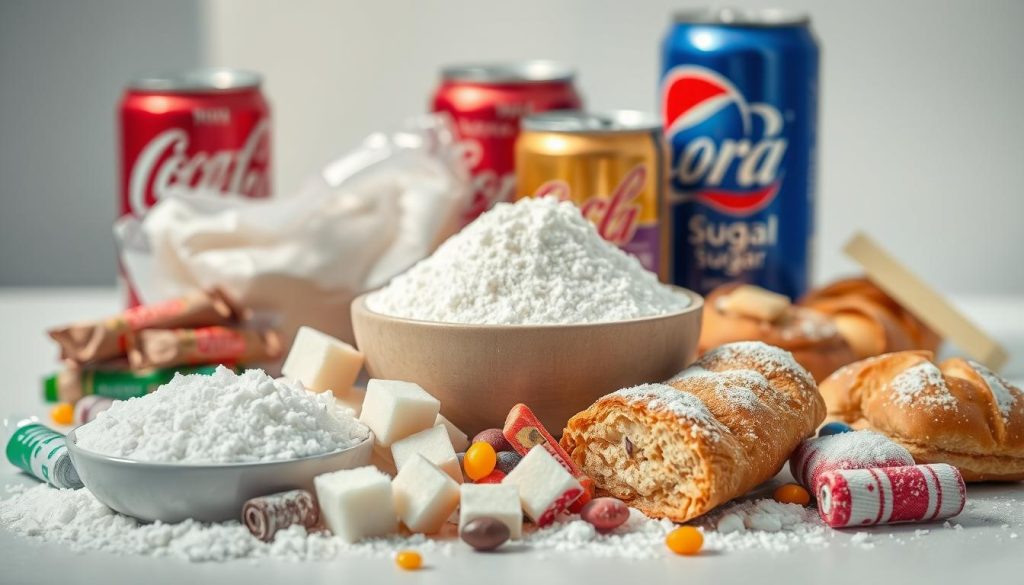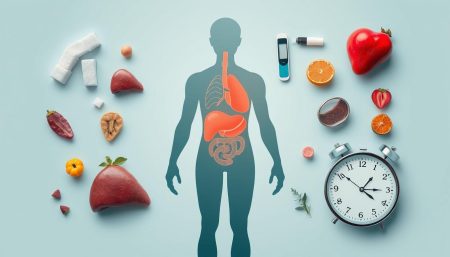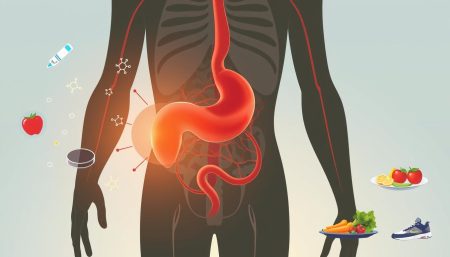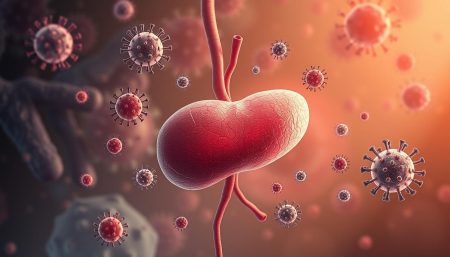Understanding what foods to avoid is key when managing healthy eating for diabetes. Knowing which foods can raise blood sugar levels is essential. This knowledge helps people with diabetes keep their blood sugar in check.
Experts from the American Diabetes Association, the International Diabetes Federation, and the Mayo Clinic agree. They say avoiding certain foods is vital for good health. This article will guide you through the important diabetic diet restrictions you need to follow.
First, we’ll identify foods that can harm your blood sugar control. This guide is your starting point for creating a diet that helps manage diabetes. We’ll then explore each food group to limit or avoid. You’ll get tips and healthy alternatives to make your meals both tasty and nutritious.
Understanding Diabetes Mellitus and Diet
Diabetes Mellitus is a big health issue worldwide, coming in two main types—Type 1 and Type 2. Both deal with how the body handles blood sugar, making managing diabetes through diet very important. The Centers for Disease Control and Prevention (CDC) says a good diet can help manage and lower the risk of serious health problems.
For those at risk or with diabetes, what they eat is key to keeping blood sugar in check. The Diabetes Care Journal points out that eating right is vital for preventing diabetes complications like nerve damage, kidney disease, and heart problems.
- Avoiding high-glycemic index foods that can trigger blood sugar spikes
- Incorporating a diverse range of nutrient-dense foods to ensure a balanced intake
- Maintaining regular meal times to stabilize blood sugar levels
The World Health Organization also backs the link between diet and diabetes. They say eating healthy can lower the risk of getting diabetes. They recommend a diet low in bad fats, sugars, and refined carbs. These foods can lead to weight gain and insulin resistance.
Managing diabetes with diet isn’t just about cutting out certain foods. It’s about finding the right balance and knowing how different nutrients affect blood sugar. The aim is to keep health stable and prevent diabetes complications by making smart food choices. This careful approach to eating is key to living well with diabetes.
The Role of Diet in Managing Diabetes
Managing diabetes well depends a lot on diet. It’s key to plan meals carefully and stick to a sugar control diet. Eating foods that raise blood sugar can make it hard to control sugar levels. This is something diabetics need to avoid to stay healthy.
How Food Affects Blood Sugar Levels
What we eat every day can change our blood sugar levels. Foods with simple carbs and sugars can cause big spikes. But, foods with more fiber help sugars enter the blood more slowly, keeping levels steady.
Principles of a Diabetic Diet for Blood Sugar Control
A good diabetic meal planning plan balances nutrients and meal times. This helps keep blood sugar in a healthy range. Here are some key tips:
- Eat whole, unprocessed foods to avoid sugar spikes.
- Add lots of non-starchy veggies for fiber.
- Choose lean proteins like chicken, fish, and beans for health.
- Watch how much carb you eat to match your body’s needs.
| Food Type | Impact on Blood Sugar | Recommended Serving |
|---|---|---|
| White Bread | High | Minimize or avoid |
| Whole Grains | Low to Moderate | 1/2 cup per meal |
| Leafy Greens | Low | 1-2 cups per meal |
| Sugary Snacks | Very High | Avoid |
Following a sugar control diet helps manage blood sugar and improves health. It also lowers the chance of diabetes complications.
The Impact of Carbohydrates on Blood Sugar
Carbohydrates are key in managing blood sugar levels. This is very important for people following a diabetic diet. Knowing which foods to avoid can help keep glucose levels healthy.
Carbs to Limit with Diabetes Mellitus
Not all carbs are the same. Some can cause blood sugar spikes, which are bad for diabetics. It’s important to limit carbs that are quickly absorbed by the body and raise blood sugar levels.
- White bread, pasta, and rice
- Sugary cereals and baked goods
- Starchy vegetables like potatoes and corn
Glycemic Index and Glycemic Load Explained
Knowing about glycemic index (GI) and glycemic load (GL) is key for managing diabetes. Foods with a high GI quickly raise blood sugar. But, glycemic load also looks at how much carb is in a food, giving a clearer picture of its effect on blood sugar.
| Food Item | Glycemic Index (GI) | Glycemic Load (GL) |
|---|---|---|
| White Bread | 75 | 30 |
| Apple | 36 | 6 |
| Lentils | 32 | 5 |
Sugar-Sweetened Beverages and Diabetes Risks
In the world of diabetes mellitus food to avoid, sugar-sweetened drinks get a lot of attention. Studies from the BMJ and The Journal of Nutrition show a clear link between these drinks and a higher diabetes risk. These drinks can lead to weight gain, which is bad for diabetes prevention. They also help cause metabolic syndrome, a group of conditions that raise diabetes risk.
Drinks like sodas, fruit punches, sweetened teas, and coffees are full of added sugars. These sugars quickly enter the blood, causing blood sugar spikes. This makes the pancreas work harder to keep insulin levels in check. Over time, this can lead to insulin resistance, a key sign of type 2 diabetes.
- Drinking SSBs often can lead to obesity, a big diabetes risk factor.
- SSBs can cause belly fat, which is linked to insulin resistance.
- Drinking these beverages regularly is linked to poor blood sugar control.
Health groups like the American Heart Association say to cut down on SSBs to lower diabetes risk. They suggest choosing healthier drinks instead to help preventing diabetes complications.
| Drink Type | Recommendation | Healthier Alternative |
|---|---|---|
| Sugar-Sweetened Soda | Avoid Regularly Consuming | Sparkling Water with a Twist of Lemon or Lime |
| Fruit Punch | Limit Intake | Homemade Infused Water with Fresh Fruit |
| Sweetened Iced Tea | Occasional Use | Iced Herbal Teas without added sugar |
| Pre-sweetened Coffee Drinks | Minimize Use | Black Coffee or Coffee with Diabetes-friendly Sweeteners |
Diabetes Mellitus Food to Avoid: Refined Sugars
Managing a sugar control diet means avoiding refined sugars. These sugars can raise blood sugar levels quickly and unpredictably. This makes it harder to control blood sugar.
Refined sugars are in many processed foods, sugary drinks, and desserts. People with diabetes should check food labels for hidden sugars. Look for words like corn syrup, dextrose, fructose, or anything ending in “-ose”.

Choosing healthier sweeteners is a good idea. Stevia, erythritol, or a little raw honey can be good alternatives. But always check with a health expert first and use them in moderation.
Learning about refined sugars and their effects on a sugar control diet helps make better choices. This can lead to better health and well-being.
| Common Source | Types of Refined Sugars | Healthier Alternatives |
|---|---|---|
| Soda and Sweetened Beverages | High Fructose Corn Syrup | Sparkling Water with a Splash of Juice |
| Baked Goods | Sucrose | Homemade Baked Goods with Applesauce |
| Candy and Sweets | Glucose Syrup | Dates or Frozen Grapes |
Following a sugar control diet and avoiding refined sugars helps with blood sugar levels. It also improves overall health. Talking to a healthcare provider can help make dietary choices that fit individual health needs. This can help manage diabetes better.
Fatty Foods and Their Effects on Diabetes
It’s important to know how different fats affect diabetes. Fats are key in a balanced diet, but not all are good. Some fats can harm health, while others help with diabetes management.
Trans Fats and Saturated Fats to Avoid
Trans and saturated fats are bad for your heart and can make insulin resistance worse. You find them in processed foods, baked goods, and fried items. These can raise blood sugar and cause diabetes problems. The American Heart Association says cutting down on these fats is key to avoid heart disease, mainly for diabetics.
- Commercially baked pastries
- Fried foods
- Margarine
- Processed snacks
Healthy Fats That Can Fit into a Diabetic Diet
Monounsaturated and polyunsaturated fats are better for blood sugar and heart health. You can find these in:
- Avocados
- Nuts and seeds
- Olive oil
- Fatty fish like salmon and mackerel
Adding these fats to your diet is good for diabetes management. It also helps lower heart disease risks.
Processed Foods and Diabetes Complications
Processed foods are a big problem for people with diabetes. They are full of unhealthy fats, sugars, and sodium. Knowing how these foods can harm diabetes is key to making better food choices.
Processed foods often hide sugars and fats that can raise blood sugar and harm health. Even foods labeled “low-fat” can be high in calories and bad fats. Eating too much of these foods can increase heart disease risk, kidney stress, and insulin resistance. These are all big issues for managing diabetes well.
- Trans fats increase LDL cholesterol and lower HDL cholesterol.
- Excess sodium can elevate blood pressure levels.
- Added sugars can cause quick spikes in blood sugar levels.
To help people make better choices, knowing about processed foods is important. Here are some tips for spotting unhealthy processed foods:
- Read nutritional labels carefully to check for sodium, sugars, and fats.
- Choose whole, unprocessed foods as much as you can to control what you eat.
- Cook meals at home with fresh ingredients to avoid hidden sugars and fats.
| Ingredient | Why to Avoid | Healthier Alternative |
|---|---|---|
| High Fructose Corn Syrup | Causes blood sugar spikes | Natural sweeteners like honey |
| Trans Fats | Increases risk of heart disease | Monounsaturated fats like olive oil |
| Excess Sodium | Can lead to high blood pressure | Herbs and spices for seasoning |
By cutting down on processed foods, people can lower the risk of diabetes complications. Making smart food choices is a big step towards better health and well-being.
Snacking Traps: Foods That Raise Blood Sugar Levels
Managing diabetes through diet means avoiding certain snacks. High-calorie, low-nutrient snacks might be easy to grab, but they’re bad for your blood sugar. We’ll look at snacks to skip and how to pick better ones by reading labels.
High-Calorie, Low-Nutrient Snacks
Snacks like chips, cookies, and candies are full of calories but not much good for you. They can quickly raise your blood sugar, making it hard to control diabetes. Opting for snacks that are good for you can help keep your blood sugar stable and support your health.
Reading Nutrition Labels to Make Better Choices
Nutrition labels are key for planning meals with diabetes. They show what’s in your food, helping you choose wisely. Look for snacks with less sugar, more fiber, and fewer processed ingredients.
| Snack Type | Calories | Sugars | Fiber |
|---|---|---|---|
| Regular Potato Chips | 152 | 0.14g | 1.3g |
| Almonds (Raw) | 162 | 1.23g | 3.5g |
| Apple with Peanut Butter | 200 | 10.56g | 4.0g |
Learning to read labels helps you avoid bad snacks and choose better ones. This not only helps with blood sugar control but also supports long-term health and stability in managing diabetes through diet.
Alcoholic Beverages: Proceed with Caution
Managing diabetes means knowing how alcohol affects blood sugar. Alcohol can change blood sugar levels, so it’s key to drink in moderation. This part talks about the risks and how much to drink to keep blood sugar in check.
Alcohol’s effect on blood sugar isn’t simple. Drinking a bit might raise blood sugar, but too much can drop it too low. This is risky for those on insulin or certain diabetes meds. So, it’s important to watch how much you drink and when.
| Type of Beverage | Potential Blood Sugar Impact | Recommendation |
|---|---|---|
| Beer | Can raise blood sugar due to carbohydrates | Limited intake advised, opt for light versions |
| Wine | May increase or decrease blood sugar | Moderate consumption (1 glass with meals) |
| Spirits | Minimal direct impact on blood sugar | Consume with caution; avoid sugary mixers |
The American Diabetes Association (ADA) says drink in moderation. Women should have no more than one drink a day, and men two. The Diabetologia Journal also advises drinking with food to avoid low blood sugar at night.
Talking to your doctor about alcohol is key to managing diabetes. They might adjust your plan based on your health, meds, and how alcohol affects your blood sugar.
Fruits to Be Mindful Of in Diabetic Meal Planning
When it comes to healthy eating for diabetes, not all fruits are the same. Fruits are good for everyone, but people with diabetes should watch their sugar intake. Choosing fruits with less sugar and knowing how much to eat helps keep blood sugar in check.
Fruits High in Sugar and Alternatives
Fruits like bananas, grapes, and mangoes have a lot of natural sugars. This can raise blood sugar levels too much if eaten in big amounts. On the other hand, fruits like berries, cherries, and apples have less sugar and more fiber. They are better for diabetes mellitus food to avoid high sugar impact.
Portion Size and Frequency for Fruit Consumption
Controlling how much you eat is key to managing diabetes. Eating fruit in small amounts and with proteins or healthy fats helps keep blood sugar stable. It’s best to eat fruit in moderation, about two servings a day, as part of a healthy eating for diabetes plan.
| Fruit | Average Sugar Content | Recommended Serving Size |
|---|---|---|
| Bananas | 14g per medium banana | Half a banana |
| Grapes | 23g per cup | Half a cup |
| Berries (Strawberries, Blueberries) | 7g per cup | One cup |
| Apples | 19g per medium apple | Half a medium apple |

Following these tips can improve health for everyone, not just those with diabetes. Being mindful of what you eat and how much is essential for managing diabetes through diet.
White Bread, Rice, and Pasta in a Diabetes Diet
Managing diabetes means knowing which foods to avoid with diabetes. White bread, rice, and pasta are high on the list. They cause blood sugar to rise quickly. Knowing these diabetic diet restrictions helps make better food choices.
White bread, rice, and pasta come from refined grains. These grains have lost their bran and germ during processing. This means they lack fiber, vitamins, and minerals important for a healthy diet.
Their quick digestion leads to fast increases in blood sugar. This is unlike whole-grain foods, which digest slower and keep blood sugar stable.
- White bread
- White rice
- Regular pasta
Diabetic diet restrictions tell us to eat less of these foods. Studies from the Diabetes Care Journal and the American Journal of Clinical Nutrition show a link. A diet high in refined grains can lead to poor blood sugar control.
For better options, people with diabetes should choose whole grains. These include:
- Whole wheat pasta
- Brown rice
- Whole grain bread
Whole grains offer fiber, vitamins, and minerals. They help glucose release slowly into the blood. This keeps you feeling full and satisfied, preventing overeating.
The journal Nutrients says whole grains improve blood sugar control and health. They are a key part of a diabetes diet.
Healthy Eating for Diabetes: Whole Grains Over Refined
Choosing whole grains over refined ones is key in managing diabetes through diet. Whole grains are packed with nutrients and have a lower glycemic index. This helps keep blood sugar levels stable. Healthy eating for diabetes improves by adding whole grains like quinoa, brown rice, and whole wheat to meals.
Whole grains are essential for healthy eating with diabetes. They include the bran, germ, and endosperm, unlike refined grains. This means more fiber, iron, and B vitamins. The fiber in whole grains slows digestion, leading to a gradual rise in blood sugar.
- Start by adding whole grains slowly to your diet.
- Switch white rice, bread, and pasta for whole grain versions.
- Try less common whole grains like barley, millet, and amaranth for more nutrients.
Whole grains offer more than just managing diabetes. They help with weight control and heart health. To add whole grains to your diet, begin with small changes. Gradually increase your intake as you get used to it.
| Grain | Fiber (per 100g) | Glycemic Index |
|---|---|---|
| Whole Wheat Bread | 7g | 49 |
| Brown Rice | 3.5g | 50 |
| Oats | 10g | 55 |
| Quinoa | 5g | 53 |
The table shows whole grains have a lower glycemic index than refined ones. This makes them better for those focused on healthy eating for diabetes. Such choices are vital for a balanced diet that supports managing diabetes over the long term.
Preventing Diabetes Complications: Dietary Adjustments
Managing diabetes is not just about checking blood sugar levels. It also involves making smart food choices. These changes can help avoid serious health problems and improve overall health. Studies from The Lancet Diabetes & Endocrinology and JAMA show how important a good diet is for diabetes care.
Sticking to a diabetic meal plan can change lives. It offers quick benefits and lays the groundwork for long-term health. Here are some key dietary tips to follow every day:
- Eat more fiber-rich foods like leafy greens and whole grains to control blood sugar.
- Reduce refined sugars and trans fats to lower heart disease risk, common in diabetics.
- Eat at regular times to keep blood sugar stable all day.
Going beyond basic advice, a custom diet plan with a healthcare expert can make a big difference. Such plans consider your health, likes, and lifestyle. This ensures the diet changes are both helpful and easy to stick to.
| Component | Recommendation | Benefit |
|---|---|---|
| Carbohydrates | Choose complex carbs over simple carbs | Regulate blood sugar spikes |
| Fats | Opt for unsaturated fats | Lower bad cholesterol levels |
| Proteins | Incorporate lean protein sources | Support muscle health and repair |
In summary, keeping an eye on how food affects you is key to avoiding diabetes problems. With careful diabetic meal planning, you can manage your diabetes well and greatly enhance your life quality.
Customizing Your Diabetic Meal Planning
Creating a diabetic meal plan that fits your taste, nutritional needs, and lifestyle is key. It’s important to follow diabetic diet restrictions and healthy eating for diabetes. Whether you’re new to diabetes or looking to improve your plan, making it personal is essential.
How to Personalize Your Diet Plan
Start by finding out which foods are best for you and how they affect your blood sugar. Here are some steps to get you started:
- Watch how different foods affect your blood sugar and adjust your diet.
- Eat a variety of foods to get all the nutrients you need.
- Choose foods you like to make your diet enjoyable and easy to stick to.
- Change meal times and sizes to fit your daily schedule and energy levels.
Being flexible and mindful in meal planning is good for your mind and body.
Working with a Dietitian for a Tailored Meal Plan
Talking to dietitians or certified diabetes educators can make your diet plan better. They offer advice tailored to your health and needs. Here’s how they can help:
- They’ll look at your current diet and health needs.
- They’ll create a plan that fits your likes and health needs.
- They’ll help make changes as your health changes or improves.
This team effort makes managing your diabetes easier and more effective.
Choosing a diet that suits you can help control blood sugar and improve your health. With the right help, you can find a balanced and enjoyable diabetic diet. It will meet your needs and help you live a healthier life.
Building a Sustainable Diabetic Diet for Long-Term Health
Managing diabetes through diet is not just about quick fixes. It’s about creating a lasting plan that fits your changing life and needs. Studies show that a flexible diabetic meal planning approach is key to long-term health. A diet that’s enjoyable and tailored to your tastes helps you stick to it.
Finding your favorite foods and recipes is essential. These should meet your nutritional needs and make mealtime enjoyable. The American Journal of Managed Care points out that enjoying your food is vital for sticking to a healthy diet long-term. Trying new foods and recipes keeps your meals interesting and fun.
Adaptability is also critical in diabetic meal planning. Life’s changes, like holidays or work demands, can disrupt your diet. Having flexible meal plans helps you make healthy choices, even when plans change. This way, your diabetic diet stays practical and helps manage your diabetes well over time.
FAQ
Q: What foods should I avoid if I have diabetes mellitus?
A: Avoid foods high in refined sugars, unhealthy fats, and simple carbs like white bread and pasta. Also, limit sugar-sweetened drinks to keep blood sugar stable.
Q: Can diet alone be used to manage diabetes mellitus?
A: Yes, diet is key in managing diabetes. It works with exercise and medication to control blood sugar, as advised by your doctor.
Q: What are the principles of diabetic meal planning for blood sugar control?
A: Meal planning for diabetes involves balancing nutrients and choosing low glycemic foods. Read labels, control portions, and eat regular, balanced meals to avoid blood sugar spikes.
Q: How do carbohydrates affect blood sugar levels in people with diabetes?
A: Carbs affect blood sugar quickly. Choose complex carbs with low glycemic indices and monitor carb intake to keep blood sugar stable.
Q: What are the risks of consuming sugar-sweetened beverages for individuals with diabetes?
A: Sugar-sweetened drinks can raise blood sugar and lead to weight gain. This increases the risk of heart disease and metabolic syndrome.
Q: How can I identify hidden refined sugars in foods?
A: Look for “sucrose,” “high-fructose corn syrup,” and other “-ose” ingredients on labels. Avoid products with these at the top of the list or with multiple sugars listed.
Q: Why should I avoid trans fats and saturated fats, and what healthy fats are appropriate for a diabetic diet?
A: Trans fats and saturated fats harm heart health and blood sugar control. Choose healthy fats from avocados, nuts, seeds, olive oil, and fatty fish for better health.
Q: Why should I minimize processed food consumption if I have diabetes?
A: Processed foods are high in unhealthy fats, sugars, and sodium, which worsen diabetes complications. Opt for whole, nutrient-dense foods for better blood sugar management.
Q: What should I look for when choosing snacks as a person with diabetes?
A: Choose snacks low in calories but high in nutrients like fresh veggies, fruits with low glycemic indices, nuts, and whole grains. Reading labels helps make better choices that won’t spike blood sugar.
Q: How does alcohol affect blood sugar levels in people with diabetes?
A: Alcohol can raise or lower blood sugar levels and may affect diabetes medications. Drink in moderation and consult your doctor for advice.
Q: Are there any fruits I should be cautious about in my diabetic meal planning?
A: While fruits are healthy, high-sugar fruits should be eaten in moderation. Focus on lower-sugar fruits and control portion sizes to avoid blood sugar spikes.
Q: Can I eat white bread, rice, and pasta if I have diabetes?
A: White bread, rice, and pasta quickly raise blood sugar due to their high glycemic index. Choose whole grain alternatives for a slower rise in blood sugar.
Q: How are whole grains beneficial for people with diabetes?
A: Whole grains have a lower glycemic response and more nutrients and fiber than refined grains. They help control blood sugar and improve overall health.
Q: How can dietary adjustments prevent diabetes complications?
A: Making dietary changes like reducing high glycemic foods, unhealthy fats, and added sugars can manage blood sugar. This reduces risks of heart disease and neuropathy.
Q: How can I personalize my diabetic diet plan?
A: Consider your food preferences, nutritional needs, and lifestyle. Work with a dietitian or certified diabetes educator to create a personalized meal plan that meets your needs and tastes.
Q: What makes a diabetic diet sustainable for long-term health?
A: A sustainable diabetic diet is enjoyable, meets nutritional needs, and adapts to life’s changes. It should include a variety of foods to prevent boredom and be realistic for long-term blood sugar management.


















